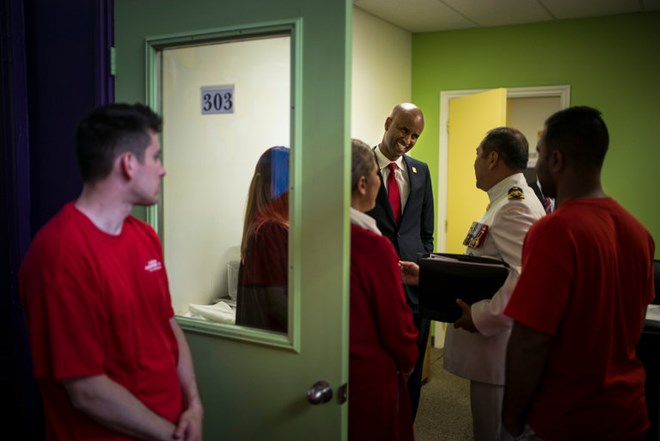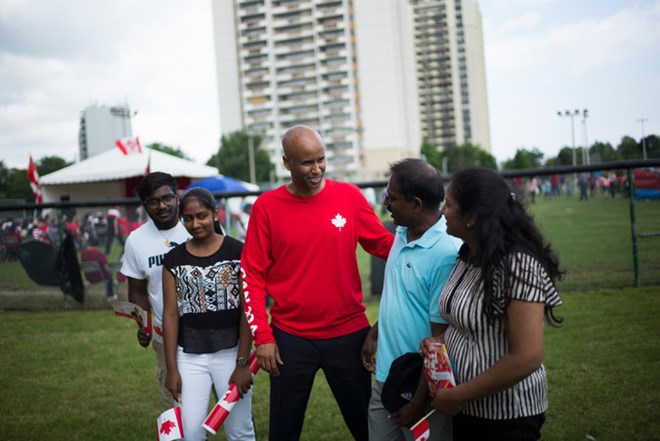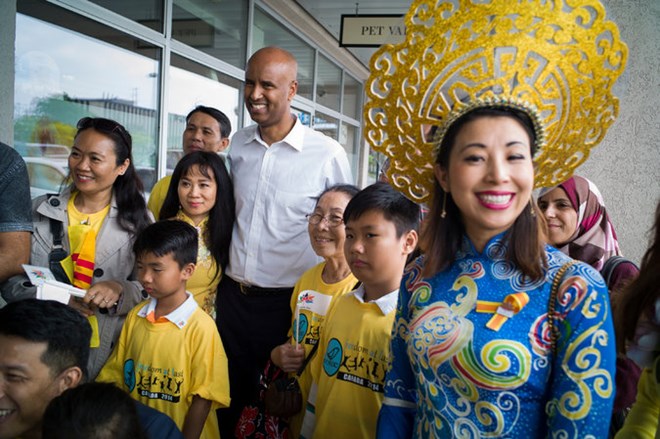
By CATHERINE PORTER
Wednesday September 6, 2017

Ahmed Hussen, Canada’s immigration minister, before taking part in a citizenship ceremony in Toronto in July. Credit Ian Willms for The New York Times
TORONTO — He arrived in Toronto, an exhausted 16-year-old, carrying nothing but a small gym bag packed with a change of clothes. As a Somali, he applied for asylum and was jettisoned into adulthood. He registered for high school, learned to cook and landed his first job all on his own.
Over the next 25 years, he put himself through college and law school, worked his way up from pouring coffee to advising one of the country’s most powerful leaders and was elected the first Somali-Canadian member of Parliament. Last January, he set another milestone for refugees to Canada: Ahmed Hussen was named the country’s immigration czar, the first refugee in that powerful cabinet position.
Yet Mr. Hussen has rarely talked about this journey. His closest friends and colleagues, all of whom describe him as a gifted conversationalist, say Mr. Hussen never confided the intimate details of his harrowing story.
“My experience is not unique,” explained Mr. Hussen, 41, from the back seat of a car in July, being whisked from one Canada Day celebration to the next. “Canada receives a lot of refugees every year.”
In his first months on the job, Mr. Hussen has become known for his steady hand on one of the country’s most delicate portfolios, promoting Canada’s increasingly rare open door to immigrants and refugees while remaining diplomatic about the slamming doors elsewhere.
That balance has become even more difficult in recent weeks, as Haitians fearing deportation from the United States have lined up at a ditch in Champlain, N.Y., to walk into Canada, overburdening the country’s refugee processing system. Pressure has mounted on Mr. Hussen to both close the border and declare Canada’s biggest trading partner unsafe for refugees, but he has remained characteristically calm and done neither.
He never raises the fact that he was an asylum seeker himself. Mr. Hussen grew up in Somalia, the youngest of six children to a long-distance trucker and doting mother he credits for his successes. Both his parents were illiterate, but his mother prized education, cajoling tutors to work with her son every day after school, including an English-speaking cousin who taught him the language.

Mr. Hussen meeting community members at the Amesbury Canada Day celebration in Toronto. Credit Ian Willms for The New York Times
Two years after leaving home, his parents announced they had bought him a ticket to Toronto — where his two eldest brothers had moved years before. He’d once glimpsed an article about the country’s prime minister’s awarding an Olympic gymnast. “I had no idea about anything else to do with Canada,” he said.
It was his first time on a plane. He recalls the surprising slap of the frigid February air as he left the airport. Since both his brothers worked night shifts, Mr. Hussen moved an hour away to Hamilton, to live with a cousin who himself was a busy college student and rarely home. A year later, in 1994, he was alone.
On the few occasions he has publicly recounted those first vulnerable months, Mr. Hussen trumpets the “everyday generosity of Canadians who helped me each and every step of the way.” Pressed for details, he offers examples so pedestrian, they invoke loneliness rather than wonder. A woman pushing a stroller stopped to show him how to use a Canadian mailbox. Another helped him decipher the strange machines in a laundromat.
“When you go through that refugee experience, it is not a free ride,” Mr. Hussen said. “You have this really long journey of settlement and integration that is very hard. You have to sort out the big stuff as well as the everyday things.”
He added, “I never had a bank account before Canada.”
He had no money for food, let alone entertainment, so he spent his free time training with two running teams and reading in the public library. He poured all his efforts into fitting in, which he offered as another reason he had kept his refugee story quiet. “I wanted to be Canadian,” he said. “I didn’t want to be the Somali guy. I still don’t.”
A government policy stalled permanent resident status to Somalis, leaving Mr. Hussen without government papers for years. He had to turn down three running scholarships to colleges in the United States.
He moved to Toronto and got a minimum-wage job pumping gas a two-hour commute away. Each morning, he left home at 5:30 to board a tram, two subways and, finally, a bus to reach the city limits. Then, to avoid paying another ticket, he would walk for 20 minutes. He saved enough to cover his first year’s tuition at York University, where he studied history.

Mr. Hussen met with members of the Vietnamese community to celebrate the sponsorship of newly landed refugees. Credit Ian Willms for The New York Times
At a community barbecue, he met a local politician who was impressed with his poise. The connection helped him land a receptionist job for Dalton McGuinty, then Ontario’s opposition leader, while he was still studying. In 2003, Mr. McGuinty won the election and became premier, and at age 27, Mr. Hussen was picked for his intergovernment affairs team.
All those nights burrowed in the public library gave Mr. Hussen an almost encyclopedic grasp of world history.
“I have this comfort being by myself and reading, developing a sense of the world around me,” Mr. Hussen said in his calm voice, each word carefully chosen.
In 2005, Mr. Hussen started law school to deepen his activism, which began with community organizing in his government-housing neighborhood and moved to leading the Canadian Somali Congress, an advocacy organization.
Harminder Dhillon, a lawyer in suburban Toronto, said he hired Mr. Hussen for his first legal job because he was so impressed by his granular knowledge of Gandhi’s independence movement. Not only had Mr. Hussen known that Gandhi’s supporters had burned down a police station in 1922, “he knew the name of the town where it happened,” Mr. Dhillon said.
Soon after Mr. Hussen opened a private practice, where he represented refugees. He married another Somali refugee, Ebyan Farah, and they have three sons.
While he might not have disclosed his struggles, they intimately define him. Ms. Farah said her husband’s car was often filled with empty bottles that he refuses to throw in public trash cans and instead carts home to recycle.
“I’m trying to leave Canada in decent shape,” Mr. Hussen said. “To me, giving back to Canada is very personal.”
Follow Catherine Porter @porterthereport on Twitter.